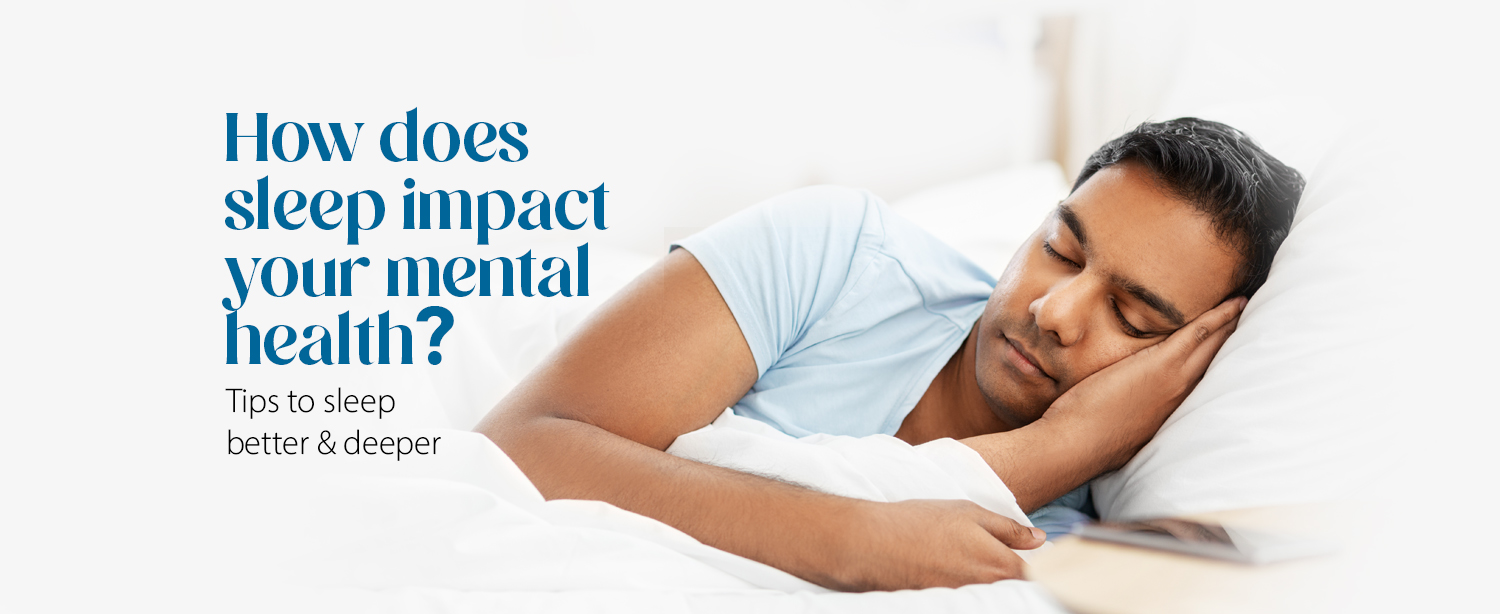According to a 2019 study by the US-based firm Fitbit across 18 countries, Indians rank as the second-most sleep-deprived population globally. On an average, we get just seven hours and one minute of sleep each night. Additionally, 61% of Indians also go through restless nights, disrupting their sleep pattern. Sleep is often undervalued in our fast-paced society, yet its impact on mental health is profound. Quality sleep is essential for cognitive function, emotional well-being, and overall mental health.
Understanding the Connection
Many of us know that a “a good night’s sleep” helps you stay refreshed and rejuvenated while poor sleep makes you more grumpy or foggy. Poor sleep patterns are linked to an increased risk of negative emotional reactions to stressors and a reduction in positive emotions.Sleep and mental health share a bidirectional relationship. On one hand, poor mental health can disrupt sleep patterns, leading to insomnia, nightmares, or restless sleep. On the other hand, inadequate sleep can exacerbate existing mental health conditions such as anxiety, depression, and mood disorders. Research suggests that chronic sleep deprivation can impair cognitive function, emotional regulation, and stress management, making individuals more susceptible to mental health issues.
The Science Behind Sleep
Sleep is a normal bodily process that allows your body and brain to rest. To comprehend how sleep impacts mental health, it’s essential to understand the stages of sleep and their significance. Your sleep consists of two main phases: Rapid Eye Movement (REM) sleep and Non-Rapid Eye Movement (NREM) sleep. REM sleep is associated with dreaming and emotional processing, while NREM sleep is crucial for physical restoration and memory consolidation. Disruptions in either phase can disrupt mood regulation, exacerbate stress, and impair cognitive function, contributing to mental health challenges.
Now that we understand the importance of sleep for mental health, let’s explore practical strategies to enhance sleep quality and duration:
- Create a Consistent Sleep Schedule
You must aim to keep your sleep and wake up time the same every day, even on weekends. Consistency helps regulate your body’s internal clock, promoting better sleep-wake cycles. - Create a Relaxing Bedtime Routine
Engage in calming activities before bed, such as reading, meditating, or taking a warm bath. Avoid screens and stimulating activities that can interfere with your ability to unwind. - Get Regular Exercise
Engage in regular physical activity, but avoid vigorous exercise close to bedtime. Exercise can help regulate sleep patterns and promote deeper, more restorative sleep. - Enhance your Sleep Environment
Transform your bedroom into a haven for rest by ensuring it’s dimly lit, noise-free, and comfortably cool. Consider upgrading to a plush mattress and supportive pillows to promote deep, rejuvenating sleep. - Limit Stimulants and Devices
Avoid caffeine, nicotine, and heavy meals close to bedtime, as they can disrupt sleep. Additionally, minimize screen time before bed, as the blue light emitted by electronic devices can suppress melatonin production and interfere with sleep quality. - Manage Stress and Anxiety
Practice relaxation techniques such as deep breathing, progressive muscle relaxation, or mindfulness meditation to alleviate stress and promote relaxation before bedtime. - Monitor your Sleep Habits
Keep a sleep diary to track your sleep patterns, including bedtime, wake time, and any factors that may affect your sleep quality. Identifying patterns can help pinpoint areas for improvement.
Sleep plays a critical role in your mental health and well-being. Sleep deprivation affects your psychological state and mental health. Individuals suffering from mental health problems are more likely to suffer from insomnia or other sleep disorders. By prioritizing good sleep hygiene and implementing healthy sleep habits, you can enhance your overall mental health and resilience. Remember that quality sleep is not a luxury but a fundamental necessity for optimal functioning and emotional balance. Start implementing these tips today to enjoy the profound benefits of restorative sleep on your mental health. If you are suffering from any sleep disorders such as sleep apnoea, restless sleep, insomnia, please connect with our team to seek support. We can offer personalized guidance and treatment options to address your specific needs. Please find below our website details for more information: https://kokilabenhospital.com


